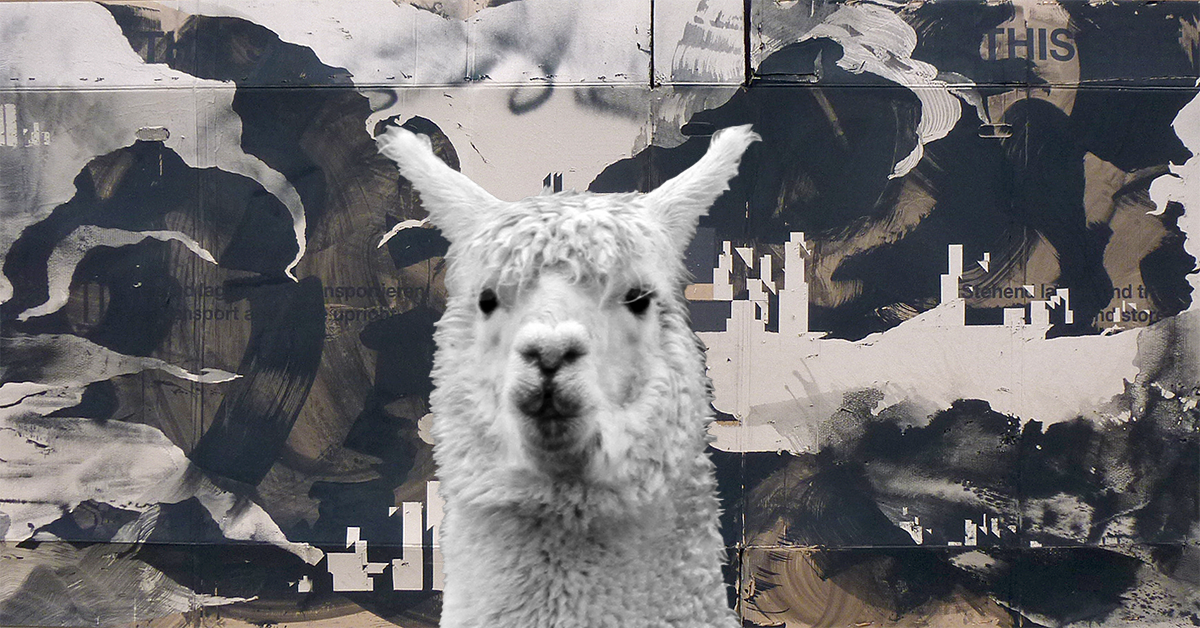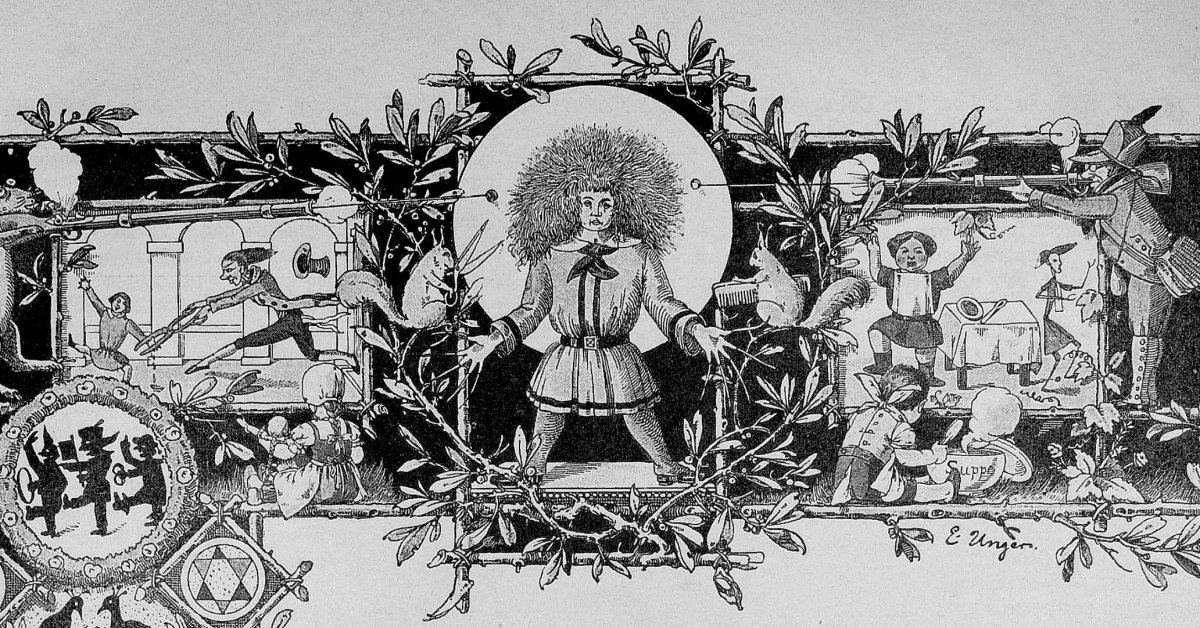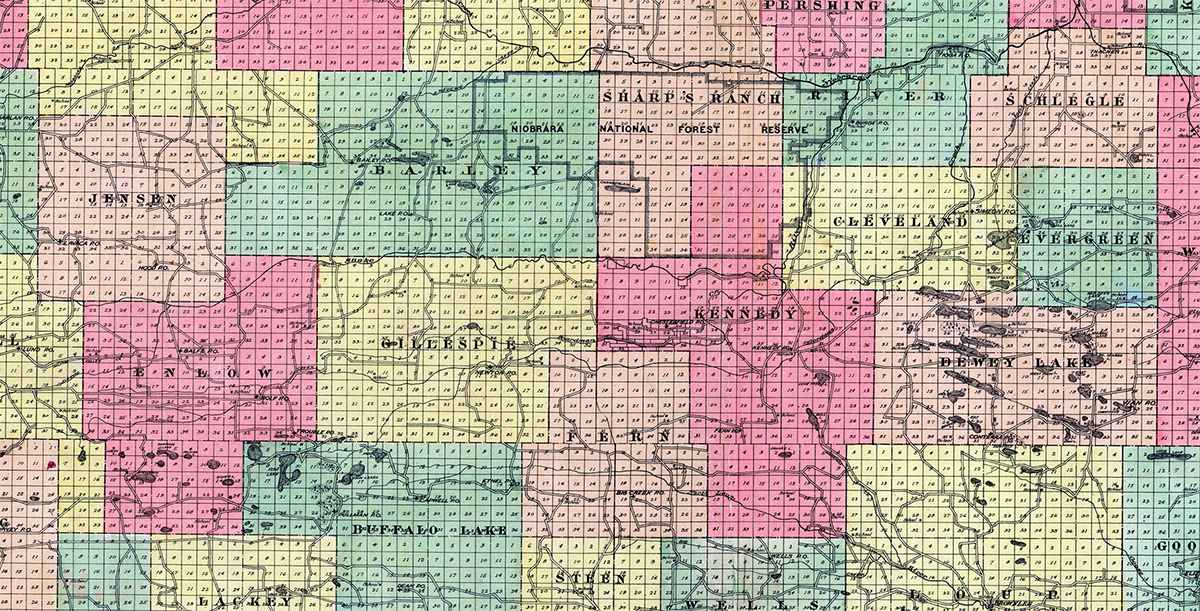Chinese artist and famed architect Ai Weiwei stands in frame, completely nude but for a small stuffed alpaca toy covering his genitals. The caption: grass mud horse covering the middle. Less than two years later, Ai was in jail without charge. It may have been the alpaca’s fault.
It’s the alpaca Ai was referring to with the “grass mud horse” bit. Because of its structure, the Chinese language sometimes ends up applying fun names to animals that aren’t native to China or its neighbors, leaving them with animals like bag mice (we know them as “kangaroos”) and fire chickens (turkeys). Alpacas have experienced a similar fate, but their official name isn’t “grass mud horse”. It’s the slightly more apt “sheep camel”.
The Grass Mud Horse, or, in Mandarin, cǎonímǎ, is a much more meaningful symbol. Mandarin is a tonal language, meaning it’s not just what sounds you put together that matter in a word, but also how you say them. Tone matters. The word “ma” in Mandarin could mean “horse”, for example, but if you inflect your voice differently, it could just as easily mean “hemp” or “mom”. In English, inflection is an optional additive to speech, a way to emphasize or distinguish something. In Chinese, it’s mandatory. It’s the critical difference between cǎonímǎ, “grass mud horse”, and cào nǐ mā, “fuck your mother”.
So Ai is actually saying something naughty — his weird nine-tenths-of-a-nude isn’t as cute and harmless as we’d thought. Still, that Chinese internet users wield coded language to obfuscate claims of maternal intercourse doesn’t make them special. If it did, I’d have to write an article of equal depth every time 14 year olds packed in shitty Discord servers come up with a new and unique insult. But where 14 year old shitsters honing their craft of online mockery are most often motivated by boredom and an adolescent need to skirt the edge, Chinese citizens like Ai are compelled by necessity and by the ever-encroaching tidal wave of government censorship. Because Ai’s crime wasn’t as simple as engaging in lewd, alpaca-adjacent photography. The final words of that original caption “covering the middle”, sound suspiciously similar to the words used to label the Chinese Communist Party’s central committee. So, in full, “grass mud horse covering the middle” is really “fuck your mother party central committee”.
The Great Firewall
The history of internet restriction in China goes back almost as far as the country’s adoption of the world wide web itself in the early nineties. Known popularly as the Great Firewall of China, government censors work tirelessly to keep out information that could be considered hurtful to the Chinese state, the ruling Communist Party, and the culture the Party wants to encourage. That means that while anti-government images (like the well-known tank man) are out, so are cultural taboos like pornography and gambling. And just as viewing pornography is not, in the eyes of the Party, a prosocial activity, neither is engaging in discourse that uses words like “motherfucker” against the government. It’s not very harmonious.
And harmony is a necessity, at least for politicians like Hu Jintao, who became General Secretary of the Communist Party in 2002 and President of China six months later. Hu’s broader modern vision for China was labeled the harmonious society (héxié shèhuì). Of course, harmony for Hu and his cohort meant a renewed focus on state stability. Avoid boat rocking at all costs. That’s harmony. So, when a new wave of censorship hit Chinese internet users, they, in turn, labeled it “héxié” — they hadn’t been censored, of course; they’d been harmonized.
The creation of the Grass Mud Horse wasn’t a chance occurrence. By the time it first gamboled awkwardly onto screens across the People’s Republic, savvy internet users were already accustomed to skirting the rules. Avoidance of government censorship isn’t as simple as knitting a euphemism or two into your speech and calling it a day; it’s all about adaptability. When the government learned citizens were using “héxié” as a stand-in for “censorship”, they censored that word too. That’s how internet denizens came up with the river crab (héxiè, note the slight difference; those accent marks are how we indicate tone).
The river crab’s story plays out in the Song of the Grass-Mud Horse, a jaunty tune sung by children and shared all over Chinese websites. The song tells the tale of the Grass Mud Horse’s heroism in defending its grassland from its natural enemy (the river crab, of course). At first listen, it’s innocuous, particularly because I don’t speak Mandarin and can’t understand any of it on my own. But an uninitiated speaker wouldn’t get much more out of it. It sounds and reads like a children’s song. It’s only to the aware that the Song of the Grass-Mud Horse becomes the tale of the Motherfuckers and their defeat of censorship.
For China’s closet dissidents, the Grass-Mud Horse was equal parts meme and victory, a moment where they could fight back against the wave of censorship, if only symbolically. But as they have since the erection of the Great Firewall, the waves crash ever-closer on the shore, and just as swiftly as the Grass-Mud Horse erupted onto the Chinese online scene, it disappeared. In 2009, the Chinese government introduced a new directive identifying 31 new types of banned content. With it went the Grass-Mud Horse.
Stories of the Chinese using their own language to flout censorship standards haven’t been as popular or widespread outside of the People’s Republic since the victory of the Grass-Mud Horse, but our Andean ungulate friend isn’t alone. He’s joined in spirit by the likes of the French-Croatian Squid (Fǎ Kè Yóu) and innumerable mythical creatures who share his unfortunate naming structure.
Our waning interest in Chinese political dissent also doesn’t mean the innovation has ceased. In 2013, the unpopular then-Chief Executive of Hong Kong was the victim of an brutal attack, hit by a Lufsig launched by a protestor. What’s a Lufsig? If you’ve ever been to IKEA, you know it as the stuffed Big Bad Wolf toy whose belly opens up to reveal Little Red Riding Hood’s undigested grandmother (if you don’t, it looks like this). “Lufsig” comes from the Swedish word “lufsa”, meaning “to lumber” (a reference to the wolf’s lumberjack-inspired outfit). Again, by this name, it’s largely meaningless. But in Cantonese, the native language of Hong Kong, IKEA branded the toy as “louh móuh sāi”. Inflect that differently, as we’ve learned to, and it becomes “lóuh móu hāi”, or “mother’s vagina”. If that’s not enough, the act of throwing a Lufsig (“dīu néih louh móuh sāi”) is remarkably similar to the phrase “díu néih lóuh móu hāi”, or “fuck your mother’s vagina”. After the attack, IKEA stores in Hong Kong sold out of Lufsigs within hours. Sellers flipped them for a quick profit online, with some opting for a symbolic price of $689 Hong Kong dollars, referencing the number of votes the Chief Executive had won in the most recent election.
I find the Grass Mud Horse, French-Croatian Squid, and kin fascinating because they’re the result of two forces meeting by necessity: the particulars of Chinese languages (with their tonal puns) and the ever-difficult challenge of attempting to effectively censor the internet. Over here, the closest thing I can think of is astute TikTok users skirting that platform’s automated moderation by replacing certain terms with sound- or look-alikes (“sewer slide” for “suicide”, “unalive” for kill/die, “le$bean” for (can you guess?) “lesbian”). TikTok is actually a decent comparison, both because of its Chinese ownership and its opaque rules and standards: TikTok won’t tell you that videos about suicide and lesbians (somehow here presented as being equally controversial) are being blocked, they’ll just silently prevent them from being included in their algorithm. Similarly, there’s no “Don’t talk about the Grass Mud Horse” law. He just grew old and disappeared on his own.
There was no revolution of the Grass Mud Horse. Ai Weiwei was jailed for 81 days before his eventual release in 2011. He was allowed to leave China in 2015 and now works on art projects from his home in Europe. The River Crab, French-Croatian Squid, and Grass Mud Horse are more than ten years old, beyond old news for Chinese internet users. I don’t know what they’ve been replaced with, or about any new clever puns used to skirt government control. Honestly, I don’t know if I’d write about them if I did. It’s not that I’m worried that the Chinese government might catch onto my schemes — I’d happily welcome a Communist Party agent as the fourth visitor to bengrapevine.com — but there’s a difference between writing about historical subversion and subversion occurring today. It’s why we don’t let newscasters talk about what the police are doing in active shooter situations, and why we don’t let Geraldo into Iraq. The Grass Mud Horse is funny. I’m sure whatever they’ve cooked up since is too. But for now, it’s theirs.
Read More
- A Dirty Pun Tweaks China’s Online Censors by Michael Wines for The New York Times
- Explaining Ai Weiwei’s ‘grass mud horse’ obsession by Max Fisher for The Washington Post
- The Grass-Mud Horse, Online Censorship, and China’s National Identity by Xiao Qiang for the University of California-Berkeley
Image
- Alpaca by Flickr user Tony Hisgett
- Harmonious Society by Wikimedia user Olicat76





